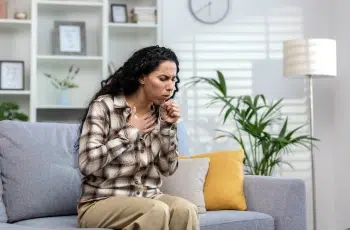Expert Tips to Beat Cold and Flu this Winter: Doctor’s Top Picks
Written by Dr Nelson Lau - MBBS FRACGP, GP & Digital Health Specialist

Contents

Winter’s arrival signals more than just woolly jumpers and comforting soups. Chilly weather often triggers a combination of sniffles, coughs and muscle aches as cold and flu viruses take hold. There are some tried-and-tested measures you can take to stay sniffle-free even if everyone around you seems to be coming down with something.
The Common Winter Bugs in Australia
First, let’s identify the usual suspects behind our winter woes:
Colds: These are usually a milder nuisance caused by over 200 different viruses – the common rhinovirus being the most frequent culprit. While antibiotics don’t combat colds, symptoms generally resolve on their own with some self-care.
Influenza (Flu): This viral illness is the real heavyweight of winter infections. Symptoms hit a lot harder and last a lot longer than common colds, leaving you feeling thoroughly miserable. People suffering from the flu often describe it as having been ‘hit by a truck’. The flu is not merely an inconvenience characterised by body aches and a runny nose. It has the potential to lead to severe complications. We’re talking about pneumonia – a serious lung infection that can result in hospitalisation. Or sinus infections that cause excruciating headaches, making you feel like your head might burst. The flu poses a heightened risk for young children, older adults, and anyone with an already compromised immune system due to underlying health conditions. That’s why getting the annual flu vaccine and adhering to preventive measures is crucial. It’s not just about avoiding a week of discomfort – the flu can have grave consequences if it escalates. Staying proactive about flu protection is vital.
COVID-19: This virus isn’t seasonal, but winter gatherings and less time outdoors can increase exposure, so staying up-to-date on vaccinations is crucial.
Tips on How to Beat the Cold and Flu This Winter
Your immune system wages valiant battles against these invading germs daily. Sometimes though, it needs backup. You can employ these tactics to support optimal immune function and lower your risk of catching winter bugs.
- Hand-washing: It’s a simple truth: Regular hand-washing sends most illness-causing viruses and bacteria straight down the drain. It’s important to scrub thoroughly and not just have a quick rinse. Make it a habit, especially after touching frequently used surfaces in public areas
- Don't Touch: Your eyes, nose, and mouth are like inviting doorways for germs. Hands are germ magnets, so avoid touching your face whenever possible. Likewise, avoid shaking hands with others especially during the flu season.
- Sleep: Skimping on sleep weakens your immune response. Aim for 7-8 hours of quality rest nightly for optimal immune function. Prioritise winding down before bed with screen-off time and doing some calming activities.
- Drink Water: Staying hydrated helps thin out mucous and flushes toxins making germs less likely to settle in comfortably. Aim for those eight glasses a day for women (10 glasses a day for men), but extra clear fluids like broths and herbal teas add an extra boost.
- Diet: A Fortress of Nutrition: Think of healthy, whole foods as your immune system’s fuel. Fruits, veggies, lean protein, and whole grains supply vitamins, minerals, and antioxidants vital for optimal immune function. Garlic and ginger, often used in winter dishes, offer some additional immune-supporting properties.
- Manage Stress: Winter’s shorter days and colder weather can do more than just bring the sniffles. For some people, the change in seasons and being cooped up indoors takes a toll on their mood. Feeling a bit down or less energetic is sometimes called the “winter blues.” But here’s the thing – your mood matters even for fighting off those colds and flu bugs. Try mood-boosting techniques like light therapy (special lamps that mimic sunlight), or bundle up and get a dose of nature – even a short walk can make a difference. Taking care of your mental health is an important part of staying strong all winter long.
- Dispel Myths: Forget those old tales about catching a cold from getting wet hair or not wearing a warm enough coat. Colds and the flu are caused by viruses, not chilly temperatures. However, dressing warmly in winter helps your body conserve energy, which leaves more resources for your immune system to do its job.
Addressing the Needs of High-Risk Groups During Flu Season
As the cold and flu season sets in, certain groups are at a heightened risk of severe illness and complications. The elderly, young children and those with chronic health conditions need special preventive measures and care strategies for their well-being during the winter. Here’s how these vulnerable groups can fortify against respiratory illnesses:
1. Senior Citizens
The elderly should prioritise receiving the annual influenza vaccination due to their increased risk of severe flu complications. Additionally, pneumococcal vaccines might be recommended for extra protection against pneumonia. Regular health check-ups are essential, especially to manage chronic conditions that could worsen flu complications.
2. Young Children
Infants and children below five years are particularly susceptible to the flu. Parents and caregivers should ensure they are vaccinated annually. Teaching proper hand-washing and respiratory etiquette is vital, and watching for symptoms like high fever or difficulty breathing requires prompt paediatric consultation.
3. Those with Chronic Illnesses
Individuals with chronic conditions such as asthma, diabetes, or heart disease should be especially vigilant. Underlying health issues can make the flu more dangerous, so annual vaccinations are important. Effectively managing these conditions during flu season is crucial, possibly involving ongoing medication, monitoring, and healthcare consultations.
4. Overall Health Maintenance
Maintaining general well-being is crucial for all high-risk groups. This includes a nutritious diet, adequate hydration, enough sleep, and effective stress management. Physical activity, within individual health limits, strengthens the immune system.
5. Exposure Minimisation
Limit contact with those showing symptoms, avoid crowded areas during peak flu season, and wear protective masks in high-risk settings to reduce the risk of contracting a virus.
Tailoring flu prevention strategies to these groups’ needs significantly reduces the risk of severe influenza complications. Regular consultations with healthcare professionals for personalised advice are highly recommended for optimal protection and care.
When to Consult a Doctor?
Most of the time, colds and milder flu cases resolve with simple home care. However, watch for the following warning signs that signal that a trip to the doctor may be necessary:
- Fever above 38°C that doesn’t improve in a few days or recurs frequently.
- Persistent coughs, especially with thick yellow or green mucus
- Difficulty breathing, shortness of breath, or chest pain
- Sudden dizziness, confusion, or severe muscle aches
- Flu symptoms improve but then suddenly worsen.
What's the most effective way of preventing the flu this winter?
Getting an annual flu vaccination is the gold standard for flu protection. It greatly reduces your risk of serious illness and needing hospitalisation. The vaccine formulation changes each year to best match the likely circulating flu strains, so even if you had it last year, a new shot is recommended for optimal winter protection.
What are the symptoms of the current flu in Australia?
Flu symptoms usually include fever, sore throat, headache, body aches, extreme tiredness, runny or congested nose, and cough. Each flu season varies a little depending on the circulating strain. It’s important to remember that flu symptoms often come on suddenly and are more severe than a common cold.
Is there anything I can take to prevent the flu?
Flu vaccinations are the most effective preventative measure. Antiviral medications, only available by prescription, can sometimes help shorten the duration or severity of illness if started very early (within 48 hrs/2 days) after your symptoms emerge. While not a substitute for vaccination, practicing good hygiene, avoiding close contact with sick individuals, and boosting your immune system with healthy habits provide additional layers of protection.
How do you avoid getting sick when someone in your house is sick?
Increase hand-washing for everyone in the household and disinfect common surfaces frequently. Isolate the ill person as much as possible, encouraging them to stay in their own room and use a separate bathroom if feasible. Consider wearing a mask in shared spaces if complete isolation isn’t practical, and open windows for improved ventilation.
Feeling sick and unsure why? Talk to a doctor online, available 24/7
Consult now
Available 24/7, across Australia.
Feeling sick and unsure why? Talk to a doctor online, available 24/7
Consult now
Available 24/7, across Australia.
Providing consult for
- Cough
- Nausea & vomiting
- Fever
- Hayfever
- Fatigue
- Sore throat
- Acne
- Gout
- Eczema
- Rosacea
- Sunburn
- UTI
- Erectile dysfunction
- Contraception
- Morning sickness
- Morning after pill
- Prostate health
- Anxiety
- Depression
- Stress
- Grief & loss
- Premature ejaculation
- Asthma
- Blood pressure
- Diabetes
- Cholesterol
- Migraines & headaches
- Allergies
- Heartburn & reflux
- Sleep disorder
- Gastro
Related Articles
Natural home remedies for cold sores: Doctor’s pick
September 19, 2025Colds
Natural home remedies for Cold Sores: Doctor’s Pick Written by Dr Nelson Lau, MBBS FRACGP...
Disclaimer
This blog is for general informational purposes only and does not indicate that Hola Health provides all treatments or preventive measures mentioned. It is not intended to be a substitute for professional medical advice. Always seek the guidance of your doctor or other qualified health professional with any questions you may have regarding your health or a medical condition. For emergencies please immediately contact 000. Any medical topics discussed are intended to educate, not to imply availability through Hola Health.




